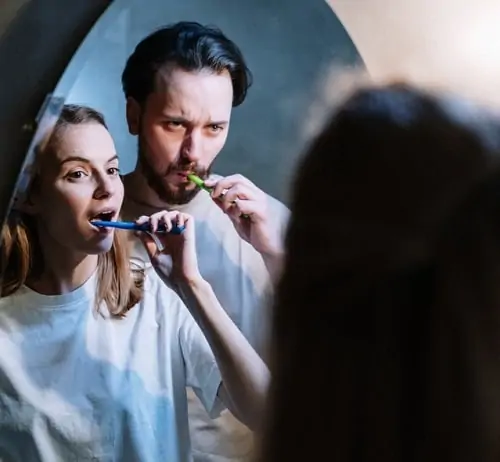
Your dentist in Clinton Township has always told you that you need to brush your teeth twice a day. But how important is that rule, really? The truth is, it’s pretty important to brush your teeth (and floss them!) every single day, twice a day, for two minutes. Skipping a brushing session once in a while won’t be detrimental to your health, but not brushing regularly can lead to some serious oral and overall health problems.
If you go without brushing your teeth every morning and every night, something bad will start to happen. It starts with almost no warning but can end in some scary results.
The problems of not brushing begin with plaque. Plaque is a sticky substance that covers our teeth. Normally it’s removed by brushing. However, if it’s left alone, it can quickly harden into tartar. In fact, it only takes 24 hours for plaque to transform into tartar. Tartar can’t be removed through at-home brushing alone and will need to be cleaned off by your dentist in Clinton Township. If that doesn’t happen, you may start to see your teeth take on a brown or yellow appearance, and it’s also when the serious problems begin.
Even a few days without brushing can put you at risk of developing an early gum disease called gingivitis. You may notice red, swollen gums or bleeding while you brush and floss (note: you should never bleed while caring for your teeth!). Now more than ever, it’s important to quickly turn to a proper oral hygiene routine to reverse the problem.
Another thing that may happen around this time is your teeth can develop cavities. The plaque we talked about earlier is packed with bacteria. These bacteria will feed on the foods we eat and release an acidic byproduct. This acid will attack tooth enamel and start to decay the teeth. Cavities can often be fixed through a simple filling by your dentist in Clinton Township, but if not treated promptly and decay progresses, you may need more complex treatment such as a root canal.
Now, back to the dangers of gum disease. Untreated gingivitis can quickly progress into full-blown periodontal disease. At this stage, bacteria have found their way under the gums, and the tissues can become detached from the teeth and bones. If this occurs, there is no treatment available to reverse the disease and it can eventually lead to tooth loss.
Even though tooth loss probably won’t happen overnight, it can happen gradually, and it can affect both your oral and overall health. Loss of our permanent adult teeth can make it difficult to eat a well-balanced meal, hurting our ability to get all the nutrients our bodies need to stay healthy. Also, when teeth are no longer around to stimulate the jawbones, the bone can deteriorate and make the face appear collapsed. Now, if tooth loss does occur, there are many ways to replace them. Whether it’s with a bridge, dentures, or dental implants, your dentist in Clinton Township can find the best solution for you.
Brushing your teeth twice a day is the best way to take care of your teeth at home and protect yourself from oral health problems. But it’s also important to maintain regular appointments with your dentist and see them every six months for checkups and cleanings.